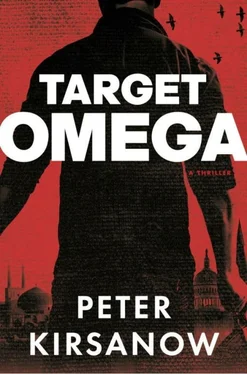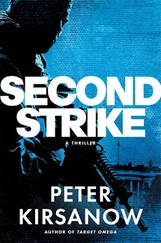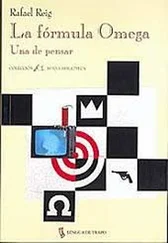“Sounds good,” Olivia said, looking forward to the chance to gather more information about Garin’s adventures in Iran. “Can you show me to my room?”
“Matt will be happy to. Since Carl will be doing the cooking, Ray will go along to keep an eye on Matt.” All four of the former special operators were grinning like schoolboys. Olivia smiled too.
“Oh,” Dwyer said as an afterthought. “And watch out for Max.”
“Who’s Max?”
NORTHERN IRAN
JULY 16 9:53 A.M. IRDT
The best palliative, Chernin found, was to keep repeating to himself the phrase “Just a few days more.” He repeated it both in his mind and out loud. He repeated it when one of the Iranians would give him a hateful look for drinking vodka. He repeated it when the North Korean technicians asked the same infernal question for the hundredth time. He repeated it most often when his boss, Stetchkin, called.
There remained little substantive work for him to do. He had come in under budget and ahead of schedule. For that, Stetchkin had rewarded him with a series of threats and rebukes, reciting all of Chernin’s deficiencies. But Stetchkin had also made good on the bonuses, deposited timely in Chernin’s account and in the correct amounts. And a premium, of all things, was added to the last bonus.
The bonuses and premium would permit Chernin a comfortable retirement. He would be able to fulfill his plan to buy a small place in the warmest village he could find on the Black Sea. He would read, boat, and make leisurely excursions to scenic destinations throughout southern Europe. He would, in short, stop living like a character from a Chekhov play.
The anticipation of these pursuits should have lifted the spirits of a man in Chernin’s position. Instead, he became more depressed as his time on the project drew to a close.
Chernin was a pragmatist, a realist. And a pessimist. He lacked a capacity for self-delusion. As such, he understood clearly that the cause of his depression was the project’s imminent success. He had presided over an enterprise that would result in the deaths of hundreds of thousands, perhaps millions, of innocents. The fact that he was being generously rewarded for his brilliant management of the project depressed him further still. The project was an abomination. Profiting from it was evil.
During the early stages of the endeavor, its potential consequences were too remote in time to give Chernin much pause. Then, as work proceeded, the scale of the damage the project would cause continued to make the effects too enormous to grasp.
But now the project was complete. And although Chernin had no capacity for self-delusion, he had a healthy capacity for avoidance. He tried to ignore the purposes of what he’d been working on for the last three years. But he could avoid them no longer.
Chernin wasn’t a man given to frequent introspection. He rarely gave much thought to whether he was a good man, a bad man, or something in between. He was more concerned with survival than self-evaluation.
Lately, however, he’d asked himself what kind of man gives his best efforts to an endeavor that would cause horrific suffering. For a while he had compared himself to those who had worked on the Manhattan Project. Those scientists had created a terrible instrument that had extinguished tens of thousands of lives indiscriminately and instantly.
But his inability to engage in self-delusion ensured that the comparison was short-lived. Those men had created a terrible weapon for the purpose of bringing a war to an end, to ultimately save the estimated millions of lives that would have perished with an invasion of the Japanese mainland. Chernin’s work had no such noble purpose, regardless of the deranged rationalizations of the mullahs in Tehran or the sterile explanations of the schemers in the Kremlin.
At another point, he thought a better comparison might be to the crew of the Enola Gay. After all, like them, he was simply carrying out the orders of his superiors with no real knowledge of the ramifications of such orders. But again, the crew members of the Enola Gay were on a mission to end a war, not start one. Chernin quickly resigned himself to the fact that the most apt comparison was to the engineers of the Final Solution, those efficient ciphers who asserted at Nuremberg that they were merely following orders. And that really depressed him.
He resorted to vodka more frequently. It helped temporarily, but afterward he would often be even more despondent. At such times he would occasionally stroll along the catwalks outside his office, silently cursing the circumstances that had placed him here with these insufferable wretches.
In the last few months he had found a rather unlikely companion with whom to commiserate. Although Chernin had mentioned a few irrelevancies about the project to Mansur, it was the North Korean technician, Dong Sung Park, in whom he most frequently confided.
Most of the North Koreans were a source of aggravation for Chernin. They seemed perpetually intent on demonstrating their competence in missile technology. They weren’t shy about giving unsolicited advice and recommending changes in protocols. Even by Russian standards, they were abrupt and undiplomatic.
Park was different. He was quiet and unassuming. Despite the fact that he was in his early thirties and had no apparent connection to the leaders of the North Korean regime, he was the head of his nation’s missile contingent, supervising men much older and with more seniority. In the rigid North Korean hierarchy, that fact alone spoke volumes.
What set Park apart from the rest of the North Koreans, however, was his attitude toward the project. Like Chernin, Park had serious misgivings about the endeavor, its purpose, and the involvement of the Iranians. Because Park was painfully cautious, even for someone who had spent his entire life under a mercurial totalitarian regime, it took several months of daily interaction with the man for Chernin to begin to recognize that Park might not necessarily agree with the party line.
In the last few months, Park had begun opening up to Chernin and the two had come to place a good deal of trust in each other. Each loved his respective country, if not his leaders, deeply. Each had an immediate superior who was a vainglorious tyrant. Each despaired that the project was a monument to miscalculation at best and to lunacy at worst.
Other than Mansur, Park was the only person in Iran whose company Chernin didn’t merely tolerate, but actually enjoyed. Although Park had a reserved demeanor, Chernin found that his coworker could become quite animated when talking about matters other than missiles. Chernin learned that Park was an avid boxing fan who seemed to know more about Joe Louis, Muhammad Ali, and Manny Pacquiao than most biographers. He was also, of all things, an amateur poet, albeit a rather horrid one. And he was something of a vodka snob, claiming, impossibly, that soju was superior to anything Russian.
Once, over a presumably inferior bottle of Smirnoff, Chernin asked Park about his family. It was the first time Chernin had ever seen Park’s expression anything other than placid. Even though they were alone and, Chernin believed, outside the range of any monitoring devices, Park lowered his voice to a whisper. Chernin realized the whisper wasn’t to avoid being overheard, but rather to suppress rage. The members of Park’s immediate family — his mother, father, and two older sisters — were all dead. Park declined to talk about their deaths other than to say that it had something to do with their having provoked the displeasure of the North Korean regime, an offense that didn’t actually require an overt act. Park had lived with a cousin since the age of fourteen.
Читать дальше












